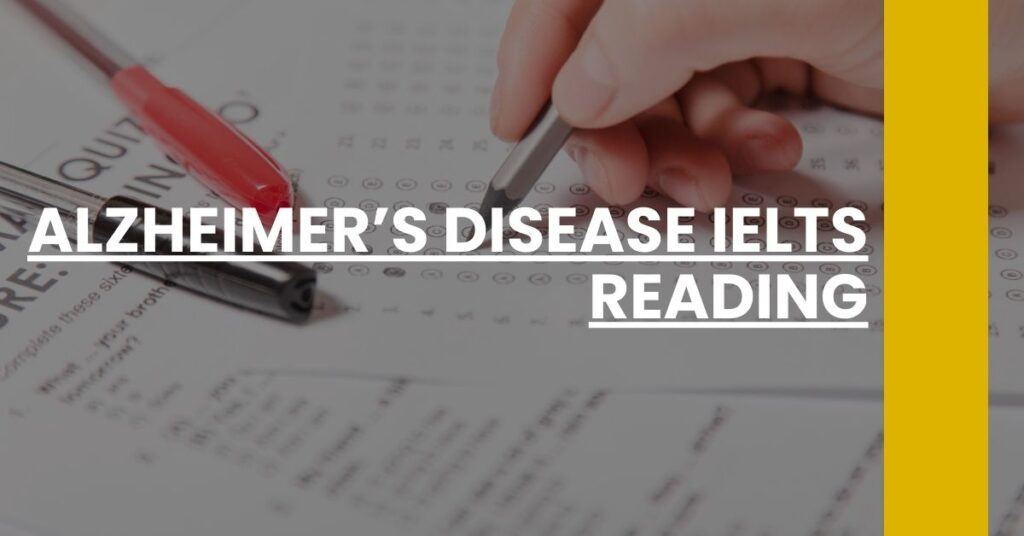Master Alzheimer’s disease IELTS reading answers today for exam triumph.
- Targeted Preparation: Equip yourself with strategies specifically tailored for the Alzheimer’s topic in IELT reading.
- Timely Revision: Prioritize the most relevant Alzheimer’s disease concepts and queries you’ll encounter.
- Score Maximization: Learn how precise answers can boost your scores in the Alzheimer’s reading section.
Secure your best score with key insights into Alzheimer’s disease IELTS reading.
- Introduction to Alzheimer’s Disease in IELTS Reading
- Strategies for Answering IELTS Reading Questions on Alzheimer’s Disease
- Common Themes Around Alzheimer’s Disease in Reading Passages
- Breaking Down Sample IELTS Reading Passages on Alzheimer’s Disease
- Language and Vocabulary Specific to Alzheimer’s Disease Topics
- Best Resources for Practice IELTS Reading Passages on Alzheimer’s Disease
- Tips for Managing Time While Reading About Complex Topics
- Examining IELTS Reading Answer Techniques for Alzheimer’s Topic
- Conclusion: Synthesizing Alzheimer’s Disease IELTS Reading Knowledge
Introduction to Alzheimer’s Disease in IELTS Reading
Alzheimer’s disease, a progressive neurological disorder, has become a frequent subject of academic texts and consequently, features often in IELTS reading sections. For those aiming to conquer the IELTS test, understanding such complex topics is not just a matter of language proficiency, but also of content familiarity.
Why Alzheimer’s Disease Features in IELTS Reading
Alzheimer’s disease is more than just a medical issue; it encompasses a broad spectrum of discussions around societal challenges, caregiver experiences, and healthcare policies, making it a multifaceted topic for IELTS reading passages. The ubiquity of this condition in modern society makes it a relevant context to test your comprehension skills.
The Cognitive Challenge
In the IELTS reading section, complex passages regarding Alzheimer’s can serve as a make-or-break point for many. Developing a solid foundational understanding can aid in parsing through the scientific jargon and extracting the main ideas effectively.
Strategies for Answering IELTS Reading Questions on Alzheimer’s Disease
Mastering IELTS reading questions about Alzheimer’s disease necessitates a blend of strategic reading techniques and subject matter insight. Here’s how you can approach this adeptly:
- Skimming for Gist: Quickly read through to grasp the overarching theme of the passage. Knowing the basics of Alzheimer’s can help you anticipate and comprehend the general content.
- Scanning for Details: Look for specific information such as names, dates, and terminologies that are often queried in the IELTS reading section.
- Keywords and Synonyms: Identifying keywords related to Alzheimer’s and recognizing their synonyms is crucial for locating answers within the text.
Common Themes Around Alzheimer’s Disease in Reading Passages
Prepare yourself for IELTS by acquainting with themes that frequently arise in relation to Alzheimer’s disease:
- Epidemiology: The statistical study of how Alzheimer’s disease affects different populations.
- Neuroscience: Understanding the brain changes associated with the disease can be a central topic.
- Social Impact: Focus on how Alzheimer’s affects families and societies, not just individuals.
Knowing these recurring themes can give you foresight when approaching related passages.
Breaking Down Sample IELTS Reading Passages on Alzheimer’s Disease
To demonstrate applying these strategies, let’s dissect a sample passage:
- Identify the Central Idea: What is the passage predominantly about? For example, it might discuss the early signs of Alzheimer’s.
- Highlight Key Terms: Note any specific Alzheimer’s-related terms you encounter.
- Analyze Question Types: Are they looking for factual answers, or do they require you to infer meaning?
Example:
Imagine a paragraph within the passage describes cognitive decline. The questions may be direct, asking for signs listed in the text, or they could ask you to interpret what this decline suggests about a person’s daily life.
Through carefully reading sample passages and following this structured approach, you will hone your ability to find those alzheimer’s disease ielts reading answers efficiently and correctly.
Language and Vocabulary Specific to Alzheimer’s Disease Topics
Diving into IELTS reading passages about Alzheimer’s disease, you’ll encounter an array of specialized vocabulary terms. Your comprehension of these terms can greatly impact your ability to derive the correct answers.
Key Medical Terminology
Understanding and remembering medical nomenclature is fundamental. Here’s what to keep in mind:
- Diagnosis and Symptoms: Words describing cognitive impairments—like “dementia” and “amnesia”—are routine.
- Treatment and Care: Familiarize yourself with terms related to care, such as “palliative” or “non-pharmacological interventions.”
- Progression of Disease: Learn stages and progression indicators—terms like “early-onset” or “neurodegeneration” are often used.
By integrating Alzheimer’s pivotal terms into your preparation, you solidify your ability to navigate through the complexity of such passages effectively.
Cognitive and Neuropsychological Terms
The IELTS reading section may also throw in neuropsychological expressions:
- Brain Structure: Keywords such as “hippocampus” or “neurofibrillary tangles” may appear.
- Cognitive Functions: Expect to see “executive function” or “spatial awareness” as part of descriptive contexts.
This specialized vocabulary is not only pivotal for locating and understanding answers but also serves to enhance your overall academic language skills.
Best Resources for Practice IELTS Reading Passages on Alzheimer’s Disease
To truly excel, finding quality resources for practice is essential. Consider these options:
- IELTS Practice Tests: Cambridge IELTS books and official IELTS practice materials are industry standards.
- Medical Journals: Articles from peer-reviewed journals, such as The Lancet or BMJ, can provide high-level texts similar to what’s found in the IELTS.
Incorporate these materials into your study routine to gain a deeper understanding and to practice with content that mirrors the complexity of what you’ll encounter on test day.
Tips for Managing Time While Reading About Complex Topics
Time management can make or break your ability to excel in the IELTS reading section, particularly with intricate topics like Alzheimer’s disease.
Effective Time Allocation Strategies
Navigating a path to success involves:
- Prioritizing Passages: Tackle passages that you find less challenging first, to guarantee points in the bank.
- Setting Passage Limits: Allocate a strict amount of time per passage to ensure you don’t run over.
By adopting strategic yet realistic time management, you can focus on quality over quantity, ensuring you don’t hastily skim over vital information.
Examining IELTS Reading Answer Techniques for Alzheimer’s Topic
Choosing the correct answers in the Alzheimer’s topic requires methodical techniques.
Locating and Selecting the Right Answer
Here’s how to nail the answer selection process:
- Assertive Answering: Be confident in your selections. If you’ve prepared well, trust your instincts.
- Cross-Referencing: Double-check answers against the passage to confirm relevancy and accuracy.
This layer of prep infuses your exam technique with the precision needed to get those all-important correct Alzheimer’s disease IELTS reading answers.
Conclusion: Synthesizing Alzheimer’s Disease IELTS Reading Knowledge
Your roadmap to mastering Alzheimer’s disease IELTS reading answers is now at your fingertips. With strategic preparation, understanding of complex medical vocabulary, and meticulous time management, you are now well-equipped to tackle this challenge head-on. Rise above the ordinary by embracing these insights and techniques, enhancing not just your IELTS scores but also your broader academic proficiency.
Alzheimer’s Disease IELTS Reading Answers: Master strategies for acing questions on Alzheimer’s in your IELTS exam with our expert guide.

